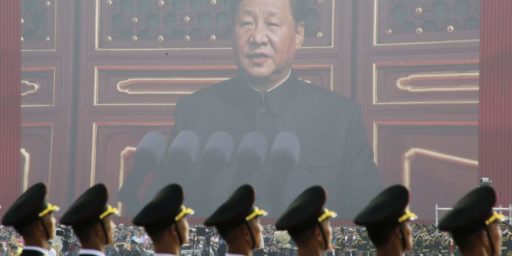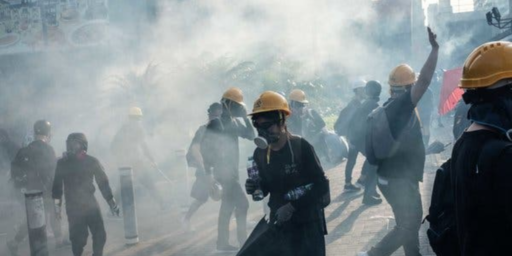China Imploding?
John Robb offers a counter-intuitive assessment of China’s path arguing that, rather than The Next Big Threat, it could be on the verge of collapse.
While the US Department of Defense continues to focus on the emerging threat of China as a conventional power and Goldman Sachs contemplates the exact date of China’s emergence as the world’s leading economy, another scenario is building steam: that China will implode.
[…]
When China’s economy does head south (since it is inevitable that all prolonged booms eventually go bust), the government’s lack of legitimacy will likely become THE central issue. Also, while some could argue that a pacifist “color” revolution will step into any breach emerges, I wouldn’t put too much faith in it. The government will resist the rise of any mass political movement violently, and it will likely be successful in this effort. Instead, the real opposition will come from a reemergence of primary loyalties that drive the development of small groups of global guerrillas.
To some extent, this may be a case of an analyst looking at all phenomena through a single prism (“if all you have is a hammer, everything looks like a nail”). Still, he cites an interesting study by Thomas Lum [PDF] of the Congressional Research Service detailing China’s woes. From the executive summary:
In the past few years, the People’s Republic of China (PRC) has experienced rising social unrest, including protests, demonstrations, picketing, and group petitioning. According to PRC official sources, “public order disturbances” have grown by nearly 50% in the past two years, from 58,000 incidents in 2003 to 87,000 in 2005. Although political observers have described social unrest among farmers and workers since the early 1990s, recent protest activities have been broader in scope, larger in average size, greater in frequency, and more brash than those of a decade ago. Fears of greater unrest have triggered debates with the Communist Party leadership about the pace of economic reforms and the proper way to respond to protesters.
Workers in state-owned enterprises and the special economic zones producing goods for export, peasants and urban residents who have lost their farmland or homes to development projects, and others have engaged in mass protests, some of them violent, often after having exhausted legal channels for resolving grievances. A December 2005 clash between villagers and police in Dongzhou village, southeastern Guangdong province, in which 3-20 villagers were killed, has became a symbol of
the depth of anger of those with grievances and the inability of Chinese administrative, legal, and political institutions to resolve disputes peacefully. U.S. interests regarding social unrest in China include human rights concerns, ongoing U.S.-funded democracy and rule-of-law programs in the country, the effects of social unrest on U.S. investments in China, and the effects on PRC foreign policy.Growing disparities of income, official corruption, and the lack of democratic institutions are likely to continue to fuel social unrest. The potential for widespread social upheaval has captured the keen attention of the Communist Party leadership. However, in the medium term, the PRC government is likely to be able to contain protests through policies that mix accommodation and violence and that promote continued economic growth. Most analysts do not expect social unrest to evolve into
a national political movement unless linkages among disaffected groups strengthen and other social groups, particularly the middle class, intellectuals, and students, join the protests as well.
For good reason, we have a tendency to overestimate the capabilities of our rivals. But the idea that the PRC is going to emerge as a peer competitor any time soon has always struck me as absurd. The have a huge population and lots of human capital, to be sure. But they have an incredible number of obstacles to overcome, as well.






It does make sense that a country the size of China wouldn’t be able to maintain a rigidly centralized gov’t indefinitely. I’m not sure “implosion” is the word; we might see a looser central gov’t with satraps or warlords having more authority over their regions.
“Growing disparities of income, official corruption, and the lack of democratic institutions are likely to continue to fuel social unrest.” Maybe the Chinese government could learn from Mideast leaders and blame the problems on Israel or maybe something closer to home like the Dalai Lama. The Middle Eastern populations seem quite contented to ask little of their government once the scapegoats have been identified.
I dunno, Anderson. For most of China’s history since the era of the warring states over 2000 years ago, it’s had a strong central government in one form or another. The early 20th Century era of warlordism was just a very short episode in the overall Chinese history. Add to that the Chinese population’s (read majority Han) belief in a nationalistic identity, I don’t really believe power will devolve to a decentralized structure anytime soon.
So lets see what the reasonable options are.
1) Status quo forever. China continues to grow its economy. Obviously absurd.
2) China rides the normal up and down roller coaster with no changes to mature as a major world economic power. This is more likely than they will defy the laws of economic gravity, but I don’t think it is real likely. For all the reasons cited, I don’t think it is going to happen. There just isn’t enough societal trust in the government to make this happen. This is more or less the route the Asian tigers (Taiwan, Korea, Singapore, Malaysia, Thailand, etc) have been going (absent the major world power). They have had some major economic shocks to the system and have comeback. Yes the chances of a coup in Thailand is much higher than in the US, but for the most part they seem to have matured enough to weather economic storms and respect political changes of fortunes between parties.
3) Big bust comes, country shatters into a bunch of ‘war lord fiefdoms’. This is arguably what the country has had for a couple hundred years. As the country got nibbled around the edges during the colonial times, the central imperial governments reach shortened and local warlords stepped into the vacuum. The nationalist government during WWII just happened to be the biggest warlord. China under Mao pretty much replaced this with internal party struggles.
This would seem to me to be one of the likelier scenarios, but not the likeliest. A nominal state government with local leaders ignoring them as they want. Of course, such a scenario would also put a major wrench in the economic engine.
4) China economy collapses and Taiwan comes to the rescue. I suspect that the Taiwanese would be the biggest inhibitor of this happening. It would be somewhat akin to Hungary pulling the Austrian-Hungarian empire back together after the fall of the soviet empire. Lots of reasons why locals wouldn’t want to do it and lots of reasons why the Taiwan would not be able to do it. Still it is a possibility if there is first a breakup into sufficiently small war lords and Taiwan goes about it step by step. It certainly won’t be a repeat of east and west Germany merging. The scenario might see China come back as an economic power, but not in our lifetime.
5) China has economic trouble and hard line communist return to power. This is a definite possibility, but I think it would have to be a gradual slide as people fondly remember the iron rice bowls of Mao and are willing to trade anything to get back to stability and enough to eat. This would put paid to China’s economic power.
6) China has economic trouble and so they start a war to get people’s minds off it. This is to me the most likely scenario. It is straight out of the “How to stay in charge of your country when the economy goes south for dummy dictators” manual. They have several possible choices of enemies depending on their objectives.
North Korea would avoid a lot of trouble with the US, but wouldn’t help put the economy back up.
Taiwan would be a perennial favorite, but is likely to have a nasty sting and depending on the president, could cause a direct conflict with the US. The people would likely be ready to accept Taiwan as a scapegoat and there would be the potential of some economic looting to help the economy.
Vietnam would be in between Taiwan and North Korea. Harder to get the people excited, less potential economic loot.
Indonesia, Philippines, Malaysia, Singapore all have their advantages, but unless they engineered a coup and could deliver their army by container ship, these are probably outside of China’s effective operational envelope.
Japan would be the big enchilada from an economic loot stand point. Its anemic defense force could likely be handled, absent a US response. People of China could probably be easily fired up for a war with Japan given the history with WWII. But the big problem is the US would almost guaranteed have to come to Japan’s rescue. But it would likely be pretty hard on Japan, which in turn would likely crater the world economy, which might make it easier for the current government to weather their own economic down turn if they could get a cease fire from Washington that included them staying.
7) A color revolution. The problem with this idea is they basically started down this path and Tienanmen square stopped it. It is pretty hard to have a peaceful revolution when the central government is willing to use force excessively and the army is willing to obey orders.
All in all, I think a variation on number 6 or 3 are the most likely.
He is also right about the economic bubble bursting. All expansions eventually end and a contraction occurs. The question is how will the populace react and how will the government react to the contraction and the populace’s reaction. I don’t much of anything about China to even hazard a wild ass guess, but that China’s economy will eventually go into recession is a given. When and how badly are open questions.
If the Chinese government thinks it has growing problems now, wait until they introduce a progressive income tax. That will really get the bells to ringing.
China has a very long history of rising and falling dynasties. The current leadership has shown, in addition to their absolute defense of their power, a pragmatism reagrding all manner of polices, especially economic. I suspect that they will try to learn the lessons of their own country’s history, and find the path to an enduring dynasty. They just might pull it off.
The key variable to watch is not necessarily the rise of dissent and opposition, but how they manage to address it.
DC Loser & Tano are probably right, but I would wonder whether the degree of centralized power in, say, the Song dynasty was up to modern nation-state standards.
–And I do mean “wonder”; I am gloriously speculating from pure ignorance, much as certain unnamed persons do on the torture issue …
Everyone says China can’t keep going the way it’s going, but how does the people in Taiwan see their position?
http://www.pekingduck.org/archives/004169.php#comments
American interests (i.e. corporate interests) knew the risk when investing in a Communist country. The most obvious is that of the possible Naturalization of their products/technology/manufacturing/resources.
I disagree, with the neocon position of protecting all of our foreign investments. The risk was and is high enough, in China, that no protection for investments should be given. Over protecting our corporate interests in China can only take us to conflict.
I suspect too many American corporations rely on China solely for their manufacturing. This does and will, translate to real power for China (regardless of government). I think that triumphs the peer competitor idea. Why rent when you can own?